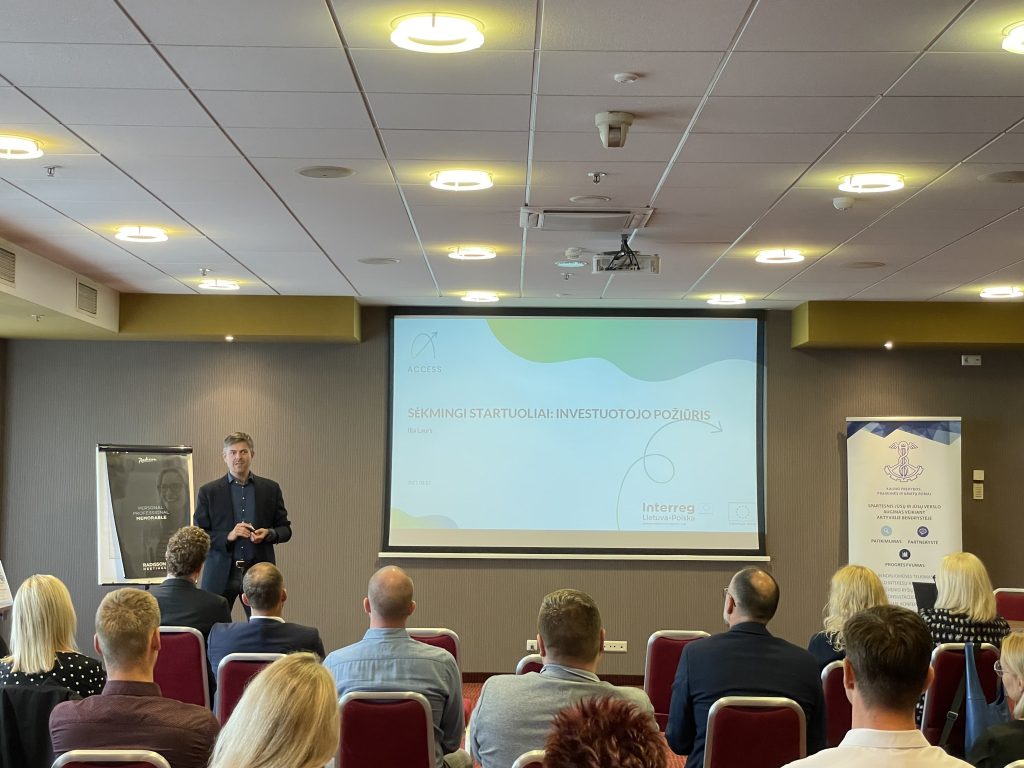
On the 17th of August, Kaunas Chamber of Commerce, Industry and Crafts invited entrepreneurs and investors to the projects’ “Acceleration of Business Support System (ACCESS)” training, the aim of which was to provide knowledge, practical examples and share experience – how to become investors in the early stages of new businesses / start-ups.
Ilja Laurs, the chairman of the venture capital fund Nextury Ventures, an investor, and the chairman of the board of the investment fund Nextury Technology Fund, led the training that allowed to meet face to face again. The assets of the Nextury Technology Fund are invested in technology companies listed on stock exchanges around the world. The author of bestseller book “Verslas naujai” shared helpful insights and tips. Almost 40 entrepreneurs took advantage of the unique opportunity to participate in the training.
“The 100% guarantee always comes with zero earnings,” Ilja Laurs told the audience, emphasizing that the return on investment in start-ups is very high. Traditional businesses are often unable to deliver maximum returns, which is why investors choose start-ups in the field of digital business and technology. If you have the funds you need to invest. Unfortunately, the training lecturer notes that the lack of financial literacy leads to investing mostly only in what is best understood, this is – real estate. Knowing the area in which you are investing is crucial to your investment success, but you should also take advantage of other investment opportunities. It is advisable to divide the investment portfolio according to the Rockefeller rule: one third is invested in real estate, one third is deposits, bonds.
“Investing in start-ups is a very specific instrument, as it involves a very high risk, but with a 10% increase. the probability can be expected 1000 percent. or even higher in returns,” said I. Laurs and emphasized the importance of active investor involvement. The passivity of the investor, according to him, is guaranteed to lead to zero return. Being active is about helping a start-up with resources, money, and contacts, because usually the main motivation of an investor is not monetary motivation, but self-realization.
Knowledge of investment risk management tools and a good understanding of investment techniques are essential to manage investor responsibilities and protect your interests. When investing in a start-up, it is important to choose an area and not to invest in incomprehensible areas, to join investor syndicates. This allows not only to manage risks, but also to accumulate investor competencies and relationships. Ideally, if the investor has a good understanding of both the start-up’s technology and the process, then not only investment, but also competence and, of course, contacts can contribute. “Sometimes one investor’s call can save two years of searching,” says Ilja.
Investors receive many applications, so when choosing where to invest, special attention should be paid to the team evaluation. Ilya notes that “a successful investment is not in the start-up, not in the idea, but in the person. The ratio of good ideas to individuals who are willing and willing to try and implement them is 100 to 1”. In addition, 80 percent. start-ups fail where they started, so the investor in the individual should look for the obsession with development of the idea, the courage to take personal risks, investing both their time and finances and other resources. An individual must have experience and competence, budget absorption expert I. Laurs advise what to avoid: “usually start-ups have a product and are looking for money for marketing, but there is a lot of information around us, a lot of different messages, so it is difficult to gain market share.”
Ilya provided the participants with general essential principles for the investor:
So how do you maximize returns for the investor? “It’s the art of finding the startup who will be the winner and helping him to the maximum,” says I. Laurs, whose experience shows that right values, agreement, and goodwill determine more than the formally defined terms in a contract.